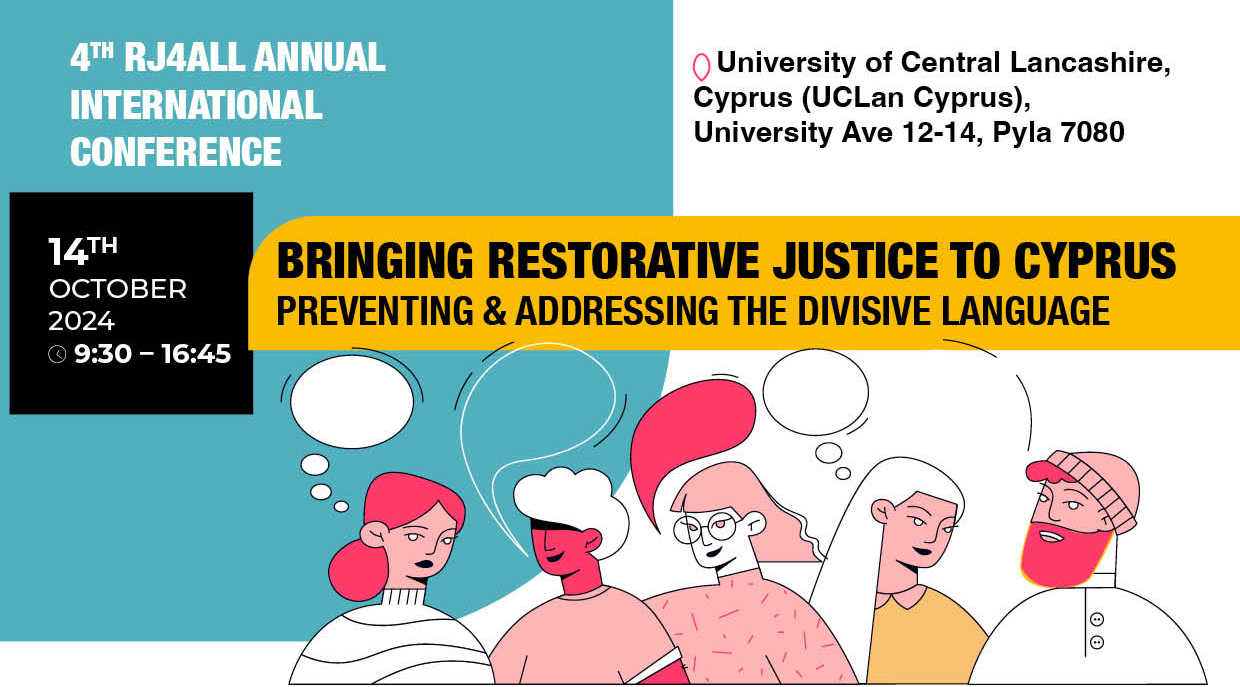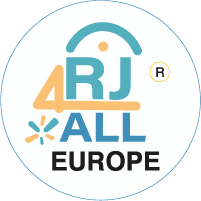


"Gentle Speech”Preventing and addressing divisive narratives through restorative justice

Project code: B54H24001310009
Project Duration: 1 – 31/10/2024
Call: Art. 8 L.R. 12/2005 AVVISO PUBBLICO 2024 per la concessione di contributi a sostegno di “INIZIATIVE PER LA PACE E PER LO SVILUPPO DELLE RELAZIONI TRA I POPOLI DEL MEDITERRANEO”
Funding Authority: Regione Puglia – Dipartimento Sviluppo economico sezione ricerca e relazioni internazionali
Coordinator: Sinergia s.c.s
The Need
There is evidence to suggest that divisive narratives in Cyprus and across Europe are increasing (Gavrielides, 2021).These are often fed by nationalism and the fear of the other. Certain groups in modern society, as these are represented by small and large political parties, believe that the concept of nation and citizenship should be limited to one ethnic or identity group, including one culture or religion (Fekete, 2018). Often, what is perceived to be inconsistencies between the defined social order and the experience of that social order by its members results in a situation of anomie that nationalists seek to resolve (Motyl, 2001). They do so by engaging in acts, policies, and structural reforms that aim to remove whatever elements are deemed unacceptable. Some of these acts may even be the result of hate or fear towards certain groups deemed as different from the perceived ‘national community’. In this journey, universal values expressed in human rights and some international agreements are seen as a hindrance to national sovereignty and a destruction from pursuing national interests.
These divisive narratives often lead to hate-motivated crime and speech. Cyprus has suffered considerably from these phenomena which are all illegal under Cypriot and EU Law. The 2008 Framework Decision on combating certain forms of expressions of racism and xenophobia requires the criminalisation of public incitement to violence or hatred based on race, colour, religion, descent or national or ethnic origin. On 9 December 2021, the European Commission adopted a Communication which prompted a Council decision to extend the current list of ‘EU crimes’ in Article 83(1) TFEU to hate crimes and hate speech. If this Council decision is adopted, the European Commission would be able, in a second step, to propose secondary legislation allowing the EU to criminalise other forms of hate speech and hate crime, in addition to racist or xenophobic motives.
Along with many recommendations, guides and toolkits, on May 7, 2024, the Council of Europe adopted the “Recommendation CM/Rec(2024)4 of the Committee of Ministers to member States on combating hate crime.” It advises member states to take comprehensive measures to prevent and combat hate crime, ensure effective criminal law provisions, support victims with specialized services, and promote a culture of inclusiveness and respect. It emphasizes training for police, the role of specialized hate crime investigators and prosecutors, and the importance of third-party reporting and data collection.

4th RJ4All Annual International Conference
Bringing restorative justice to Cyprus Preventing & addressing the divisive language
Our approach to the need
At RJ4All Europe, we believe that the law alone cannot address such complex societal phenomena. This requires an inter-disciplinary approach bringing together psychology, social and applied sciences. The law can be supported through non-violent methods of communication and practice. These are encapsulated in the ethos and practices of restorative justice (Gavrielides, 2007). We also have evidence to show that when it comes to hate related harms and speech, restorative justice can make a considerable contribution (Gavrielides, 2012).
Read more on RJ4All’s approach to hate crime and hate speech.
The project
“Misunderstanding arising from ignorance breeds fear, and fear remains the greatest enemy of peace.”
– Lester B. Pearson
In partnership with the Italian NGO Sinergia s.c.s we are conducting this project to raise awareness and increase usage of restorative justice as a means for preventing and addressing divisive narrative and especially hate related incidents and speech. The project aims to increase skills and knowledge around restorative justice methods of non-violent communication such as peace circles. The ultimate objective is to support initiatives for peace and the development of relations that encourage exchange and dialogue with the populations of the Mediterranean Basin, with a particular focus on preventing misinformation, digital illiteracy and online hate speech.
The project also aims to prevent and fight racial hatred through activities aimed at promoting digital media literacy and citizenship skills, and foster intercultural dialogue especially amongst the Greek Cypriot and Turkish Cypriot communities. This includes restorative dialogue and non-violent communication activities, with the aim of educating and raising awareness among people, providing them with the necessary skills to counter hatred and promote a more inclusive and respectful environment.
The project activities are aimed at a diverse target group, including adults and students aged 13 to 25, who may be negatively influenced by online hate and misinformation. Each group of direct beneficiaries will include a minimum of 50 participants per country, who will actively take part in workshops and awareness events. Additionally, indirect beneficiaries will also be involved through online and/or in-person actions, thereby amplifying the impact of the initiatives beyond the direct participants

Project activities
The project is carried out in Cyprus and Italy.
Activities taking place in Cyprus
- Collaboration and cross border exchanges and leading between Cyprus and Italy via the partner organisations
- Wider partnership development at the local and international level
- Capacity building material development
- International conference (14th October 2024) in partnership with the University of Central Lancashire, Cyprus (UCLan Cyprus)
- 2 Workshops of non-formal training activities on digital media literacy and misinformation will be conducted for young and adult citizens.
- 2 Workshops of non-formal training activities on non-violent communication will be conducted for young and adult citizens.
- 2 Peace making restorative justice circles based on our CPD certified ecourse “Induction to restorative justice circles”
- 1 exhibition of digital works on “Gentle Speech” produced during the workshops
- Video production and social media and media engagement.
Activities taking place in Italy
The programme and cooperation will culminate in Italy, where Sinergia s.c.s., the project coordinator, will organise and host a major international conference titled “Non-Violent Communication” in Puglia. This event will feature experts in hate speech and restorative dialogue, with RJ4All Europe represented at the conference.
The project is financially supported by Regione Puglia – Dipartimento Sviluppo economico sezione ricerca e relazioni internazionali (Puglia Region – Economic Development Department and International Relations).
The collaboration between RJ4All Europe and Sinergia not only brings together young and adult citizens to help prevent and address divisive narratives, but also provides a unique opportunity to explore and promote non-violent methods of communication across borders.
By exchanging best practices and methods, this initiative will foster a deeper understanding and connection between the two Mediterranean countries, enhancing the impact of our efforts on a broader scale.
Local partnerships
The project and its workshops are delivered in partnership with the

